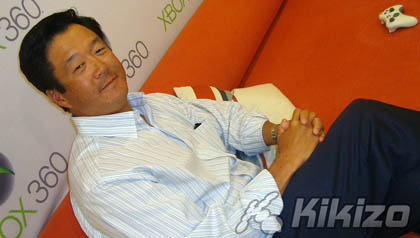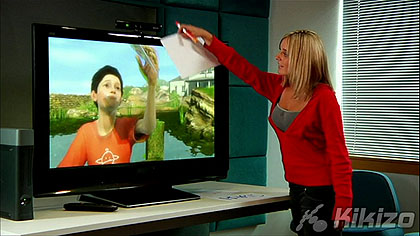Xbox Reborn: Shane Kim Interview 2009
Corp VP talks future of Xbox: Revealing chat looks at his new role, the reshuffled Game Studios, why Natal could only have come from Microsoft and swiping Sony's exclusives.
Page 2
Kikizo: I am impressed with Natal and I think you guys owned this year's E3 media briefings. But in reaching new audiences with Natal, surely the real challenge is going to be in marketing and brand perception. It doesn't really matter if Natal is the best technology or not; if we look at the success of Wii, and the unparalleled way it's tapped into this new audience, it's purely because it's been marketed from the ground up with that audience and that goal in mind. Whereas you guys are going to need to figure out how to transform the way that you position your platform.
Kim: Well I think that transformation has already started to happen - and it really started last year with NXE, and Netflix - and is continuing this year. With Natal, we've unveiled a vision for the future, and there's a path to that future, but at the same time we're trying to emphasise: there's never been a better time to buy an Xbox 360 than today. We've got great core games, and we're continuing to feed the core gamer that's been so loyal to us. But we're adding more inviting and innovative experiences for a broader audience, things like 1 Vs. 100, Joy Ride, Beatles Rock Band, those things all continue to combine to broaden the brand perception of Xbox 360, as did Netflix. Now in the UK, the addition of Sky is going to be a big deal for us. Facebook, Twitter, streaming 1080p HD, all of those things are designed for a broad massmarket audience.
So we have work to do to transition, and to continue to transition the Xbox 360 brand, but I think by the time Project Natal arrives, we will already be much farther along that curve than where we're at today. I mean, I feel much better about the Xbox brand today than I did a year ago, simply because we're less known than we were before as "just the Halo shoot box". So as we continue to deliver these experiences, we integrate the social networks - and really that's a great experience, where Facebook looks and feels like a native Xbox Live application, but you're connected to the entire Facebook world as you'd want to be - as we continue to do more and more of that, I'm confident that we'll be well positioned. And much like the Wii, obviously did marketing around Wii, and that's what it was right from the get-go. But I would argue a lot of the Wii's success to date has been word-of-mouth - I mean it's become a pop-culture phenomenon in a sense, right? I think we have the sense to be able to do that. I really do believe we have the opportunity to do that, and even more so with Project Natal.
Kikizo: Do you think there are some areas where you could learn from Nintendo though looking at what they've done in terms of marketing and PR? Even things like the precision of their placements in women's lifestyle magazines and stuff.
Kim: I actually think we have an amazing PR organisation and operation. We talk to those people, now we have even more to talk to those people about. It's not that we don't have any dialogue with those folks, it's just that look, we can only tell people so much... "hey, we've got great parental controls, yeah, so that your kids won't play mature-rated games if that's the way you want to manage game playing in your household". Now we can say that we offer controller-free gaming and entertainment, we offer amazing social networking experiences, we offer great great entertainment experiences with last.fm, you know, instant-on HD... now I think we have a better story, more interesting content for those people to talk to their respective audiences about. More so than we did at this time last year.
Kikizo: With Natal, how have you guys been able to put together something that has impressed not just the games community, but has made headlines in the world of technology, gadgets, computing, as well as heavy impact on mainstream media? Why didn't Sony or Nintendo come up with Natal first?
Kim: The important thing there is that this is not just an Xbox [Entertainment and Devices Division] technology. Being part of Microsoft is a huge competitive advantage for us, because we get to take advantage of all the research and development work that's taking place throughout the company - you know, we're taking advantage of voice recognition technology that's developed elsewhere, that's not by our [Entertainment and Devices] organisation; the natural user interface work that Microsoft Research has done is being taken advantage of here too. We're doing a lot of work obviously to bring that all together, and make it relevant for our world, simplify it so that we can hand it off to developers, who can create experiences. I mean I've never seen Peter Molyneux so juiced up like than he is about Project Natal and the potential it creates for someone like him. Milo started when I was still head of Microsoft Game Studios - and I mean... well, you met Milo, right? For Molyneux as a game designer, to really start to take advantage of that kind of technology, and build empathy in a character that he creates, is something that he's excited to take advantage of, and really we've only scratched the surface in what you've seen so far.
But we can bring that to life in a way that we previously couldn't if we were limited to the controller; it's like the Mass Effect dialogue system, which was considered fairly progressive at the time - you're still picking between three options - now you're starting to get to the point where you can have much more of a natural conversation and not be limited to the choices that are presented to you by the controller. But there's no way we would be in this position if we were doing all the R&D work ourselves [at Entertainment and Devices]. Really, when you get right down to it, that's a huge competitive advantage. When you look at what the competitors are doing, we are very far ahead, with more complex technology in my opinion.








 Satoru Iwata Video Interview - the late Nintendo president spoke with Kikizo in 2004 as 'Nintendo Revolution' loomed.
Satoru Iwata Video Interview - the late Nintendo president spoke with Kikizo in 2004 as 'Nintendo Revolution' loomed. Kaz Hirai Video Interview - the first of Kikizo's interviews with the man who went on to become global head of Sony.
Kaz Hirai Video Interview - the first of Kikizo's interviews with the man who went on to become global head of Sony. Ed Fries Video Interview - one of Xbox's founders discusses an epic journey from Excel to Xbox.
Ed Fries Video Interview - one of Xbox's founders discusses an epic journey from Excel to Xbox. Yu Suzuki, the Kikizo Interview - we spend time with one of gaming's most revered creators.
Yu Suzuki, the Kikizo Interview - we spend time with one of gaming's most revered creators. Tetris - The Making of an Icon: Alexey Pajitnov and Henk Rogers reveal the fascinating story behind Tetris
Tetris - The Making of an Icon: Alexey Pajitnov and Henk Rogers reveal the fascinating story behind Tetris Rare founders, Chris and Tim Stamper - their only interview? Genuinely 'rare' sit down with founders of the legendary studio.
Rare founders, Chris and Tim Stamper - their only interview? Genuinely 'rare' sit down with founders of the legendary studio. The History of First-Person Shooters - a retrospective, from Maze War to Modern Warfare
The History of First-Person Shooters - a retrospective, from Maze War to Modern Warfare